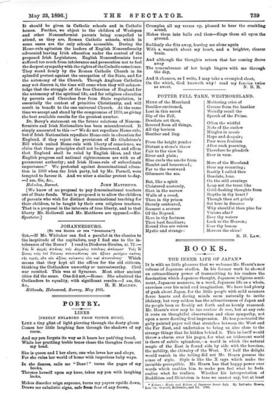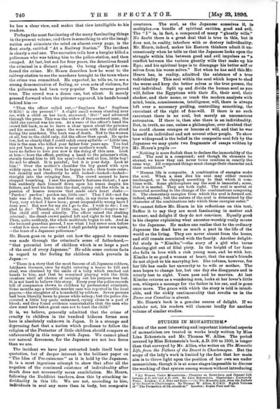BOOKS.
THE INNER LIFE OF JAPAN.*
IT is with no little pleasure that we welcome Mr. Hearn's new volume of Japanese studies. In his former work he showed an extraordinary power of transmitting to his readers the fascination which Japanese thought, Japanese religions senti- ment, Japanese manners, in a word, Japanese life as a whole, exercises over his mind and imagination. We have had plenty of gush about Japan, for the little people with mild manners fierce hearts and daring minds seem naturally to invite idolatry, but very seldom has the attractiveness of Japan and its people been so freshly set forth and so keenly reasoned. Mr. Hearn's view may be too couleur de rose, but at any rate it rests on thoughtful observation and close sympathy, not upon a mere dazzling first impression. He hats penetrated the gaily painted paper veil that stretches between the West and the Far East, and undertakes to bring us also close to the strange things that lie hidden behind it. This in itself would throw a charm over his pages, for what an iridescent world is there of subtle splendour,—a world in which the natural magic of the East is found side by side with the heroism, the nobility, the chivalry of the West. Yet half the delight would vanish in the telling did not Mr. Hearn possess the sense of style. Style is like the X rays which make the invisible perceptible. Mr. Hearn has that happy power over words which enables him to make you feel what he feels. realise what he realises. Whether his interpretation of Buddhism and Shintoism is true we cannot say, but at least • Koleoro : Jimts and Echoes of Japainem Inner Life. Bf Lafcadio Hearn, Lon 'on: tr-good, IdclivainP, and Co. 1996.
he has a clear view, and makea that view intelligible to his readers.
Perhaps the most fascinating of the many fascinating things in the present volume, and there is something to stir the imagi- nation and stimulate the mind on almost every page, is the first study, entitled "At a Railway Station." The incident is clearly a real one. The narrative tells how a burglar killed a policeman who was taking him to the police-station, and then escaped. At last, but not for four years, the detectives found the criminal in a distant prison. On being charged he con- fessed the crime. Mr. Hearn describes bow he went to the railway-station to seethe murderer brought to the town where the crime was committed. He expected, he tells us, to see a strong demonstration of feeling, or even acts of violence, for the policeman had been very popular The reverse proved true. The crowd was a dense one, but silent. It merely pressed forward when the prisoner appeared, his hands bound
behind him :—
"Then the officer called out,—' Sugihara San ! Sugihara ! is she present ? ' A slight small woman standing near me, with a child on her back, answered, 'Hai!' and advanced through the press. This was the widow of the murdered man ; the child she carried was his son. At a wave of the officer's hand the crowd fell back, so as to leave a clear space about the prisoner and his escort. In that space the woman with the child stood facing the murderer. The hush was of death. Not to the woman at all, but to the child only, did the officer then speak. He spoke low, but so clearly that I could catch every syllable •—• Little one, this is the man who killed your father four years ago. You had not yet been born ; you were in your mother's womb. That you have no father to love you now is the doing of this man. Look at him—! here the officer, putting a hand to the prisoner's chin, sternly forced him to lift his eyes]—look well at him, little boy ! Do not be afraid. It is painful ; but it is your duty. Look at him !' Over the mother's shoulder the boy gazed with eyes widely open, as in fear ; then he began to sob ; then tears came ; but steadily and obediently he still looked—looked—looked- straight into the cringing face. The crowd seemed to have stopped breathing. I saw the prisoner's features distort ; I saw him suddenly dash himself down upon his knees despite his fetters, and beat his face into the dust, crying out the while in a passion of hoarse remorse that made one's heart shake :— ' Pardon ! pardon ! pardon me, little one ! That I did—not for hate was it done, but in mad fear only, in my desire to escape. Very, very wicked I have been ; great unspeakable wrong have I done you! But now for my sin I go to die. I wish to die ; I am glad to die ! Therefore, 0 little one, be pitiful !—forgive me !' The child still cried silently. The officer raised the shaking tniminal ; the dumb crowd parted left and right to let them by. Then, quite suddenly, the whole multitude began to sob. And as the bronzed guardian passed, I saw what I had never seen before —what few men ever see—what I shall probably never see again, —the tears of a Japanese policeman."
Mr. Hearn goes on to point out how the appeal to remorse was made through the criminal's sense of fatherhood,— " that potential love of children which is so large a part of the soul of every Japanese." He adds some curious facts in regard to the feeling for children which prevails in Japan :— "There is a story that the most famous of all Japanese robbers, Ishikawa Goemon, once by night entering a house to kill and steal, was charmed by the smile of a baby which reached out hands to him, and that he remained playing with the little creature until all chance of carrying out his purpose was lost. It is not hard to believe this story. Every year the police records tell of compassion shown to children by professional criminals. Some months ago a terrible murder case was reported in the local papers,—the slaughter of a household by robbers. Seven persons had been literally hewn to pieces while asleep ; but the police dis- covered a little boy quite unharmed, crying alone in a pool of blood; and they found evidence unmistakable that the men who slew must have taken great care not to hurt the child."
It is, we believe, generally admitted that the crime of cruelty to children in the hundred hideous forms seen here is absolutely unknown in Japan. It is a strange and depressing fact that a nation which professes to follow the religion of the Protector of little children should compare so unfavourably in this respect with Japan. We cannot plead our natural fierceness, for the Japanese are not less fierce than we are.
The incident we have just extracted lends itself best to quotation, but of deeper interest is the brilliant paper on "The Idea of Pre-existence" as it is held by the Japanese. It is a most ingenious attempt to show that after all the negation of the continued existence of individuality after death does not necessarily mean annihilation. Mr. Hearn, following the Buddhist teachers, does this by attacking in- dividuality in this life. We are not, according to him, individuals in soul any more than in body, but composite creatures. The soul, as the Japanese conceives it, le multiplex,—a bundle of spiritual entities, good and evil-
The " I " is, in fact, a compound of many "ghostly wills." No doubt there is a great deal that is true in this, but it
does not, in reality, interfere with or destroy individuality'.. Mr. Hearn, indeed, makes his Eastern thinkers admit it un-
consciously when he tells us that the Japanese looks upon the struggle within him between good and evil impulses as " a conflict between the various ghostly wills that make up his Ego; and his spiritual hope is to disengage his better self or selves from his worse selves." But when he has said this Mr; Hearn has, in reality, admitted the existence of a true individuality. This soul within the soul which hopes to shed
the worse and keep the better selves is the true person, the real individual. Split up and divide the human soul as you will, follow the Egyptians with their Ka, their soul, their
shadow, and their name, or track the modern analysts with mind, brain, consciousness, intelligence, will, there is always left over a necessary guiding, controlling something, the executant of the right of free-will. If there is no such
executant there is no soul, but merely an unconscious automaton. If there is, then also there is an individuality. But, in truth, no one, unless a philosopher, ever doubted that-
he could choose oranges or lemons at will, and that he was- himself an individual and not several other people. To show how widespread is the belief in the composite soul felt by the Japanese we may quote two fragments of essays written by Mr. Ream's pupils :—
"Nothing is more foolish than to declare the immortality of the soul. The soul is a compound; and though its elements be eternal, we know they can never twice combine in exactly the same way. All compound things must change their character and. their conditions."
" Human life is composite. A combination of energies make the soul. When a man dies his soul may either remain unchanged, or be changed according to that which it com- bines with. Some philosophers say the soul is immortal; some, that it is mortal. They are both right. The soul is mortal or immortal according to the change of the combinations composing it. The elementary energies from which the soul is formed are, indeed, eternal; but the nature of the soul is determined by the character of the combinations into which those energies enter."
We cannot follow Mr. Hearn in his reflections on this text. Suffice it to say they are most fascinating in matter and manner, and delight if they do not convince. Equally good
is his chapter explaining what ancestor-worship really means to the Japanese. He makes one realise that to the ordinary Japanese the dead have as much a part in the life of the world as the living. They are never absent from the home,. and still remain associated with the family. Another delight-
ful study is "Kimiko,"—the story of a girl who turns, dancing-girl out of filial piety. In the height of her fame
she falls in love with a rich young man, and he with her. Kimiko is so good a woman at heart, that the man's friends do not object to his marrying her. She refuses, however, for
her life has made her unworthy to be wife or mother. The. man hopes to change her, but one day she disappears and is, utterly lost to sight. Years pass and he marries. At last Kimiko returns as a wandering nun, looks at her lover's little
son, whispers a message for the father in his ear, and is gone once more. The grace with which the story is told is inimit- able, and the sickly sentimentality that revolts us in the
Dame aux Camelias is absent.
Mr. Ream's book is a genuine source of delight. If we mistake not, his readers will clamour loudly for another volume of similar studies.



































 Previous page
Previous page